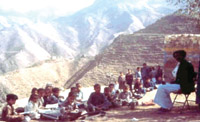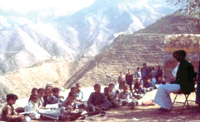
Education officials and fraud teachers [Archives:2006/944/Reportage]
May 8 2006
 |
and Saddam Al-Ashmouri
“Half of my salary goes to the head of the Educational Center in return for my not doing my duty as a teacher. At least this helps me find another work so that I can provide for my family,” said teacher Nasser Saleh who belongs to the Education Office of Sana'a governorate.
Many teachers and education officials confess that there are teachers who are excused from fulfilling their jobs with the help of corrupt officials in the Education Office. They say this phenomenon is still rampant and is not only confined to the educational sector, but to some other sectors, and is similarly applied in the Capital City, Sana'a. In order to be exempted from teaching, a teacher should give half or much of his salary to the head of the educational center in which he is assigned or to some other influential employees in the Education Office.
Mr. Hussein Hazeb, head of the Education Office of Sana'a governorate, attributed this phenomenon to the low standards of living. “Those teachers who give part of their salaries to some employees in order not to teach can find other jobs so that they can improve the status of their lives. We had discovered some cases and dealt with them legally. When a teacher is reported not doing his job, then he should be fired according to the law.” But Hazeb commented that there are no evidences of this phenomenon when reporting such cases.
Dr. Hussein Al-Junaid, Sana'a University, made it clear that this phenomenon has been widespread for a long time, especially in the military sector. He held the Ministry of Education responsible in this regard as it selects unqualified and dishonest headmasters
“This phenomenon has been also found in the educational sector, and consequently education becomes contingent on empty pockets. In a word, it is a threat to Education.”
For others local councils are also responsible for the spread of this phenomenon. For one thing, local councils are responsible for selecting teachers in every district. Teacher Khalid, who refused to state his surname, accused both local councils and of helping some teachers escape from doing their jobs. ” I swear by God the Almighty that I know of heads of local councils who share the salaries of teachers who are excused from work. Also, I know of a head of an educational center who shares the salary of twenty teachers.”
Ms. Amel Mohammed said she was shocked to know that many teachers are used to receiving their salaries from the Ministry of Education although they do not attend schools to perform their duties. “A friend of mine who is a teacher explains to me that she knows many female teachers who never attend schools as they are busy working in some jobs so that they can improve their low income.”
Undoubtedly, the Education Office conducts field visits to schools in order to make sure whether teachers perform their duties or not. Occasionally, a team of observers visits schools in different districts to report cases of such teachers. However, before it arrives a school, the headmaster or other teachers notifies any absent teacher to attend school. “It is good that the Education Office conducts field visits, but unfortunately some times the team members responsible for monitoring teachers are dishonest. As they discover cases of fraud teachers, they are bribed so as not to report them to the Education Office. Also, before they arrive school, teachers are notified by headmasters or heads of educational centers to attend schools or bring others to replace them. Therefore, teachers find it an easy task to share their salaries with some education officials and stay at home without performing their duties,” said teacher Adel Mohammed. At times it is difficult for the team to reach some remote districts. “Sometimes the team does not visit remote schools for fear of dangerous mountainous villages. This in turn makes teachers not adhere to attending schools regularly,” added Adel Mohammed.
Perhaps the main reason behind this “unlawful” act is teachers' low salaries and absence of officials' effective role. Teacher Murad Al-Sultan said the Ministry of Education is mainly responsible for the spread of teachers exempted from attending schools.
“Most of those who do not perform their duties as teachers seek to improve their low income. They work in private schools or somewhere else. Some of them are expatriate in Gulf countries, and some are mere farmers,” pointed out Mr. Nasser Al-Hamami.
Mr. Mohammed Hizam, a headmaster, explained there are good job opportunities especially in private schools. “Teachers are living in grim living conditions. Teachers' status should be improved in terms of giving them good salaries and bonuses. Also, inspection campaigns should be organized directly and to cover remote areas, not only the Capital City or other cities. ”
The consequences of this phenomenon have bad effects on the development of education in the country. For one thing, schools in remote areas still suffer from lack of teachers, which results in bad educational levels on the part of students. “Students themselves are, by and large, a victim to teachers' absenteeism. In some areas, only one teacher is available and has to teach all subjects. The result is this: our students finish their studies while they are yet unable to read and write effectively. You see, most of the teachers prefer to teach in areas where Qat is widespread, and the result is that their mind remains hollow,” explained Hajji Hamoud who belongs to Bani Hishaish district in Sana'a.
A recent research paper mentioned that “rates of absenteeism among salaried teachers are very high, and for this reason student teacher ratio are often greater than official figures indicate.” Another report states that “Education in Yemen has been transformed from an instrument for a progressive change and advancement to a station for reproducing the backwardness in its various forms. This was a result of the backward nature of the educational philosophy and curriculum, bad governance and widely prevailing corruption, and also because of the inefficient nature of public expenditure on education.
——
[archive-e:944-v:14-y:2006-d:2006-05-08-p:report]


